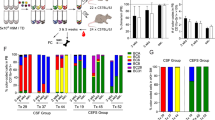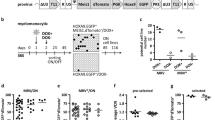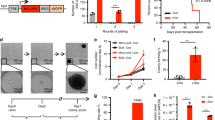Abstract
The polycomb group (PcG) proteins, particularly Bmi1, have an essential role in maintaining the self-renewing capacity of leukemic stem cells (LSCs). Although one of their major targets in LSCs is known to be the Ink4a/Arf tumor suppressor gene locus, the role of PcG proteins in the leukemic reprogramming of target cells into LSCs is not well characterized. In this study, Bmi1−/− granulocyte/macrophage progenitors (GMPs) were transformed with the leukemic fusion gene MLL–AF9. Although Bmi1 was not essential to the immortalization of GMPs in vitro, Bmi1−/− cells showed enhanced differentiation and retained less LSCs. A number of genes were derepressed in the absence of Bmi1 including potential tumor suppressor genes. Transplantation assays demonstrated that Bmi1 was indispensable for the development of leukemia in vivo and deletion of both the Ink4a and Arf genes only partially restored the leukemogenic capacity of Bmi1−/− LSCs. Of note, the complementation of immortalized Bmi1−/−Ink4a-Arf−/− GMPs with Bmi1 failed to restore the expression of the majority of deregulated genes and leukemogenic activity in vivo. These findings indicate that Bmi1 is essential for the faithful reprogramming of myeloid progenitors into LSCs and unveil that leukemic fusion genes require PcG proteins exerting an effect in concert to establish LSC-specific transcriptional profiles, which confer full leukemogenic activity on LSCs.
This is a preview of subscription content, access via your institution
Access options
Subscribe to this journal
Receive 12 print issues and online access
$259.00 per year
only $21.58 per issue
Buy this article
- Purchase on Springer Link
- Instant access to full article PDF
Prices may be subject to local taxes which are calculated during checkout






Similar content being viewed by others
References
Pietersen AM, van Lohuizen M . Stem cell regulation by polycomb repressors: postponing commitment. Curr Opin Cell Biol 2008; 20: 201–207.
Lessard J, Sauvageau G . Bmi-1 determines proliferative capacity of normal and leukemic stem cells. Nature 2003; 423: 255–260.
Park IK, Qian D, Kiel M, Becker MW, Pihalja M, Weissman IL et al. Bmi-1 is required for maintenance of adult self-renewing haematopoietic stem cells. Nature 2003; 423: 302–305.
Iwama A, Oguro H, Negishi M, Kato Y, Morita Y, Tsukui H et al. Enhanced self-renewal of hematopoietic stem cells mediated by the polycomb gene product, Bmi-1. Immunity 2004; 21: 843–851.
Jacobs JJL, Kieboom K, Marino S, DePinho RA, van Lohuizen M . The oncogene and Polycomb-group gene bmi1 regulates proliferation and senescence through the ink4a locus. Nature 1999; 397: 164–168.
Oguro H, Iwama A, Morita Y, Kamijo T, van Lohuizen M, Nakauchi H . Differential impact of Ink4a and Arf on hematopoietic stem cells and their bone marrow microenvironment in Bmi1-deficient mice. J Exp Med 2006; 203: 2247–2253.
Lee TI, Jenner RG, Boyer LA, Guenther MG, Levine SS, Kumar RM et al. Control of developmental regulators by Polycomb in human embryonic stem cells. Cell 2006; 125: 301–313.
Oguro H, Yuan J, Ichikawa H, Ikawa T, Yamazaki S, Kawamoto H et al. Poised lineage specification in multipotent hematopoietic stem and progenitor cells by the polycomb protein Bmi1. Cell Stem Cell 2010; 6: 279–286.
Mihara K, Chowdhury M, Nakaju N, Hidani S, Ihara A, Hyodo H et al. Bmi-1 is useful as a novel molecular marker for predicting progression of myelodysplastic syndrome and patient prognosis. Blood 2006; 107: 305–308.
Mohty M, Yong AS, Szydlo RM, Apperley JF, Melo JV . The polycomb group BMI1 gene is a molecular marker for predicting prognosis of chronic myeloid leukemia. Blood 2007; 110: 380–383.
Chowdhury M, Mihara K, Yasunaga S, Ohtaki M, Takihara Y, Kimura A . Expression of Polycomb-group (PcG) protein BMI-1 predicts prognosis in patients with acute myeloid leukemia. Leukemia 2007; 21: 1116–1122.
Cozzio A, Passegu E, Ayton PM, Karsunky H, Cleary ML, Weissman IL . Similar MLL-associated leukemias arising from self-renewing stem cells and short-lived myeloid progenitors. Genes Dev 2003; 17: 3029–3035.
Huntly BJ, Shigematsu H, Deguchi K, Lee BH, Mizuno S, Duclos N et al. MOZ-TIF2, but not BCR-ABL, confers properties of leukemic stem cells to committed murine hematopoietic progenitors. Cancer Cell 2004; 6: 587–596.
Krivtsov AV, Twomey D, Feng Z, Stubbs MC, Wang Y, Faber J et al. Transformation from committed progenitor to leukaemia stem cell initiated by MLL-AF9. Nature 2006; 442: 818–822.
Lee J, Son MJ, Woolard K, Donin NM, Li A, Cheng CH et al. Epigenetic-mediated dysfunction of the bone morphogenetic protein pathway inhibits differentiation of glioblastoma-initiating cells. Cancer Cell 2008; 13: 69–80.
Schlesinger Y, Straussman R, Keshet I, Farkash S, Hecht M, Zimmerman J et al. Polycomb-mediated methylation on Lys27 of histone H3 pre-marks genes for de novo methylation in cancer. Nat Genet 2007; 39: 232–236.
Kitamura T, Koshino Y, Shibata F, Oki T, Nakajima H, Nosaka T et al. Retrovirus-mediated gene transfer and expression cloning: powerful tools in functional genomics. Exp Hematol 2003; 31: 1007–1014.
Wang Y, Krivtsov AV, Sinha AU, North TE, Goessling W, Feng Z et al. The Wnt/β-catenin pathway is required for the development of leukemia stem cells in AML. Science 2010; 327: 1650–1652.
Singh MK, Petry M, Haenig B, Lescher B, Leitges M, Kispert A . The T-box transcription factor Tbx15 is required for skeletal development. Mech Dev 2005; 122: 131–144.
Chiba T, Miyagi S, Saraya A, Aoki R, Seki A, Morita Y et al. The polycomb gene product BMI1 contributes to the maintenance of tumor-initiating side population cells in hepatocellular carcinoma. Cancer Res 2008; 68: 7742–7749.
Rizo A, Olthof S, Han L, Vellenga E, de Haan G, Schuringa JJ . Repression of BMI1 in normal and leukemic human CD34+ cells impairs self-renewal and induces apoptosis. Blood 2009; 114: 1498–1505.
Bracken AP, Helin K . Polycomb group proteins: navigators of lineage pathways led astray in cancer. Nat Rev Cancer 2009; 9: 773–784.
Ortega S, Malumbres M, Barbacid M . Cyclin D-dependent kinases, INK4 inhibitors and cancer. Biochimica et Biophysica Acta 2002; 1602: 73–87.
Bruggeman SW, Hulsman D, Tanger E, Buckle T, Blom M, Zevenhoven J et al. Bmi1 controls tumor development in an Ink4a/Arf-independent manner in a mouse model for glioma. Cancer Cell 2007; 12: 328–341.
Wiederschain D, Chen L, Johnson B, Bettano K, Jackson D, Taraszka J et al. Contribution of polycomb homologues Bmi-1 and Mel-18 to medulloblastoma pathogenesis. Mol Cell Biol 2007; 27: 4968–4979.
Douglas D, Hsu JH, Hung L, Cooper A, Abdueva D, van Doorninck J et al. BMI-1 promotes ewing sarcoma tumorigenicity independent of CDKN2A repression. Cancer Res 2008; 68: 6507–6515.
Acknowledgements
We thank Maarten van Lohuizen and Ronald A DePinho for providing Bmi1+/− mice and Ink4a+/− mice, respectively, and Lay Hess for the MLL-AF9 plasmid. This study was supported in part by Grants-in-aid for Scientific Research (#21390289) and for the Global COE Program (Global Center for Education and Research in Immune System Regulation and Treatment), MEXT, Japan, a Grant-in-aid for Core Research for Evolutional Science and Technology (CREST) from the Japan Science and Technology Corporation (JST), and a grant from the Takeda Science Foundation.
Author information
Authors and Affiliations
Corresponding author
Ethics declarations
Competing interests
The authors declare no conflict of interest.
Additional information
Author Contributions
JY designed and conducted the research, performed experiments, interpreted the data, and wrote the paper; MT, MN and HO conducted research; HI performed the microarray analysis; and AI was responsible for execution of the research, interpretation of the data and the writing of the paper.
Supplementary Information accompanies the paper on the Leukemia website
Supplementary information
Rights and permissions
About this article
Cite this article
Yuan, J., Takeuchi, M., Negishi, M. et al. Bmi1 is essential for leukemic reprogramming of myeloid progenitor cells. Leukemia 25, 1335–1343 (2011). https://doi.org/10.1038/leu.2011.85
Received:
Revised:
Accepted:
Published:
Issue Date:
DOI: https://doi.org/10.1038/leu.2011.85
Keywords
This article is cited by
-
PCGF1-PRC1 links chromatin repression with DNA replication during hematopoietic cell lineage commitment
Nature Communications (2022)
-
MYSM1 inhibits human colorectal cancer tumorigenesis by activating miR-200 family members/CDH1 and blocking PI3K/AKT signaling
Journal of Experimental & Clinical Cancer Research (2021)
-
Structural heterogeneity of the mammalian polycomb repressor complex in immune regulation
Experimental & Molecular Medicine (2020)
-
Chromatin regulatory mechanisms and therapeutic opportunities in cancer
Nature Cell Biology (2019)
-
The novel BMI-1 inhibitor PTC596 downregulates MCL-1 and induces p53-independent mitochondrial apoptosis in acute myeloid leukemia progenitor cells
Blood Cancer Journal (2017)



